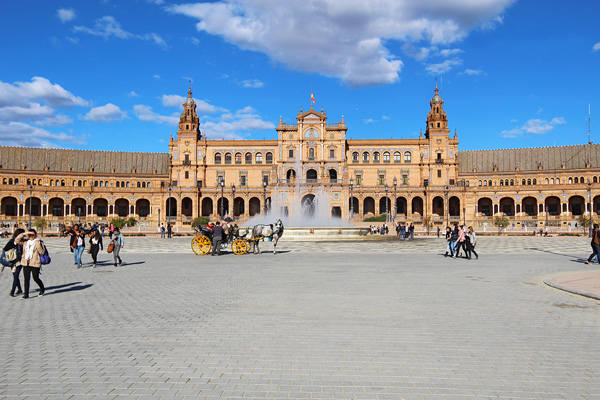Public Transportation in Seville
Summary: Learning how to get around using public transportation in Seville is an important step in adjusting to life in Seville. In this article, we cover the local public transportation options.

Seville, the capital of Andalusia, is a city that is well-served by a variety of public transportation options. These include the Seville Metro, buses operated by TUSSAM (Transportes Urbanos de Sevilla), trams, and a network of bike lanes. The city's compact size and flat terrain also make it ideal for walking. Whether you're an expat or a tourist, you can comfortably navigate the city without a car.
Seville Metro
The Seville Metro is a light metro network serving the city of Seville and its metropolitan area. It is a relatively new addition to the city's public transportation system, having opened in 2009. The metro is safe, clean, and efficient, making it a popular choice for both locals and visitors. It operates from 6:30 am to 11 pm on weekdays, and until 2 am on Fridays, Saturdays, and the eve of public holidays. A single ticket costs €1.35, but there are also multi-trip tickets and monthly passes available. The metro has four lines that cover most of the city, including key tourist attractions and residential areas. It is safe to use at all times, including at night, and is a reliable mode of transport for women travelling alone or children going to school.
TUSSAM Buses
TUSSAM operates a comprehensive network of bus routes that cover the entire city and its suburbs. The buses are reliable and punctual, and they run frequently throughout the day. A single ticket costs €1.40, but there are also multi-trip tickets and monthly passes available. The buses are safe to use at all times, and they are equipped with CCTV cameras for added security. The bus network is extensive, so you can get to virtually any part of the city using this mode of transport. The buses also connect to the metro and tram lines, making it easy to transfer between different modes of transport.
Trams
Seville's tram system is a convenient way to get around the city centre. The tram line, known as MetroCentro, runs from the San Bernardo train station to the Plaza Nueva, passing by key attractions such as the Cathedral and the Alcazar. The trams run every 5-7 minutes from 6 am to 1:30 am. A single ticket costs €1.40, but there are also multi-trip tickets and monthly passes available. The trams are safe to use at all times, and they are a popular choice for tourists due to their proximity to major attractions.
Bike Lanes
Seville is a bike-friendly city, with over 170 km of bike lanes crisscrossing the city. The city's bike-sharing program, Sevici, has over 250 stations where you can pick up or drop off a bike. A weekly pass costs €13.33, making it an affordable option for getting around the city. The bike lanes are safe to use at all times, and they are a popular choice for locals and expats alike. The city's flat terrain and pleasant weather make cycling a viable option for commuting or leisurely rides.
In conclusion, Seville's public transportation system is comprehensive, reliable, and safe. Whether you prefer to travel by metro, bus, tram, or bike, you can get to virtually any part of the city without a car. The city's compact size and pedestrian-friendly streets also make walking a viable option for short distances. So, whether you're an expat living in Seville or a tourist visiting the city, you can comfortably rely on the public transportation system and walking to get around.
About the Author
 Joshua Wood, LPC joined Expat Exchange in 2000 and serves as one of its Co-Presidents. He is also one of the Founders of Digital Nomad Exchange. Prior to Expat Exchange, Joshua worked for NBC Cable (MSNBC and CNBC
Primetime). Joshua has a BA from Syracuse and a Master's in Clinical and Counseling Psychology from Fairleigh Dickinson University. Mr. Wood is also a licensed counselor and psychotherapist.
Joshua Wood, LPC joined Expat Exchange in 2000 and serves as one of its Co-Presidents. He is also one of the Founders of Digital Nomad Exchange. Prior to Expat Exchange, Joshua worked for NBC Cable (MSNBC and CNBC
Primetime). Joshua has a BA from Syracuse and a Master's in Clinical and Counseling Psychology from Fairleigh Dickinson University. Mr. Wood is also a licensed counselor and psychotherapist.
Some of Joshua's articles include Pros and Cons of Living in Portugal, 10 Best Places to Live in Ireland and Pros and Cons of Living in Uruguay. Connect with Joshua on LinkedIn.
Additional Information:
- Public Transportation in Seville
- Best Neighborhoods for Single Digital Nomads Living in Seville
- Pros & Cons of Living in Seville
- Best International Schools and Bilingual Schools in Seville
- 7 Weekend Getaways for Digital Nomads Living in Seville
- Best Bookstores and Libraries in Seville
- Fun Classes for Expats Living in Seville
- Public Transportation in Seville
- Best Markets in Seville
- Retire in Seville Guide
- 7 Tips for Living in Seville
- Pros & Cons of Living in Seville
- Health Care in Seville
- Discovering the Best of Seville
- Cost of Living in Seville
- Healthcare & Health Insurance in Spain
- Best Places to Live in Spain
- Real Estate in Spain
- 10 Tips for Living in Spain
- Pros and Cons of Living in Spain 2025
- 2025 Guide to Moving to Spain




